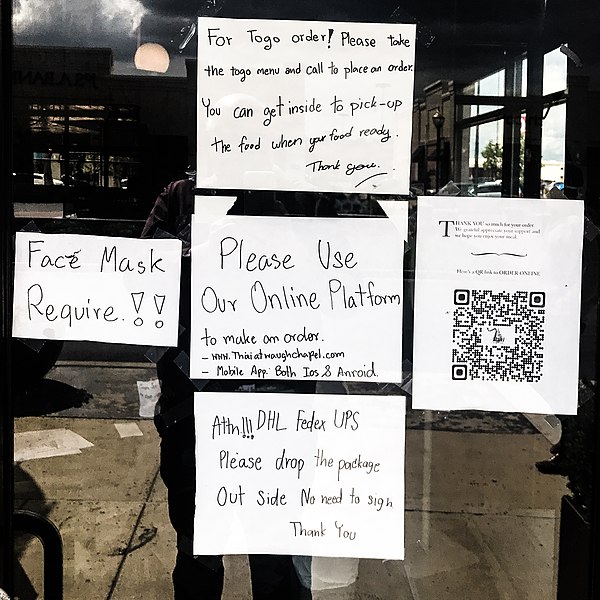Economic impact of the COVID-19 pandemic
The COVID-19 pandemic has had far-reaching economic consequences including the COVID-19 recession, the second largest global recession in recent history, decreased business in the services sector during the COVID-19 lockdowns, the 2020 stock market crash, which included the largest single-week stock market decline since the financial crisis of 2007–2008 and the impact of COVID-19 on financial markets, the 2021–2023 global supply chain crisis, the 2021–2023 inflation surge, shortages related to the COVID-19 pandemic including the 2020–present global chip shortage, panic buying, and price gouging. It led to governments providing an unprecedented amount of stimulus. The pandemic was also a factor in the 2021–2022 global energy crisis and 2022–2023 food crises.
Best Buy was only letting a limited number of people into their Union Square store in New York City, 18 March 2020
Retail suffered 40–60% drop in footfall in Mar 2020
Signs on a Thai Restaurant in Crofton, Maryland
A branch of SESC Hotels in São João da Barra, Brazil, closed due to the pandemic.
The COVID-19 recession, also known as the Great Lockdown, was a global economic recession caused by the COVID-19 pandemic. The recession began in most countries in February 2020. After a year of global economic slowdown that saw stagnation of economic growth and consumer activity, the COVID-19 lockdowns and other precautions taken in early 2020 drove the global economy into crisis. Within seven months, every advanced economy had fallen to recession.
Scanning electron microscope image of SARS-CoV-2 (centre, yellow)
A nearly empty flight from Beijing to Los Angeles during the pandemic






